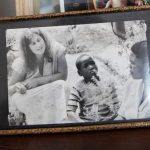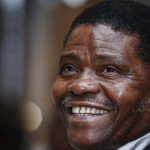Joseph Shabalala’s call to raise our spirits higher
Ladysmith Black Mambazo’s founding member, who died this week, took his music from hostel rooftops to music’s grandest theatres and, now, to the skies.
Author:
14 February 2020

Joseph Shabalala, composer and founding member of the South African supergroup Ladysmith Black Mambazo, died on 11 February 2020 after a long illness.
His life, like his vocal range, encompassed giddy highs and brooding lows. In music, he found a space to channel the complexities of this profound duality.
Shabalala’s brother, Headman, with whom he had founded Mambazo in 1964, was murdered in 1991 by an off-duty security officer in a shooting many maintain was politically motivated. Shabalala’s wife Nellie was also murdered, in 2002, and Shabalala was injured while trying to apprehend the masked killer outside their home in Clermont, Durban. Shabalala’s son Nkosinathi was initially charged with hiring the perpetrator but was eventually acquitted.
Related article:
Nellie’s death deeply affected Shabalala – a pain he channelled into the reflective 2003 album Raise Your Spirit Higher, which won a Grammy for Best Traditional World Music Album the following year. The award was one of five Grammys Mambazo has won over the years, the most by any South African music group or artist. The others include Shaka Zulu, which won the 1989 Grammy for Best Folk Album; Ilembe, which nabbed the 2009 Grammy for Best Traditional World Music Album; Live: Singing for Peace Around the World, which garnered recognition with the Best World Music Album Grammy in 2013; and Shaka Zulu Revisited: 30th Year Anniversary Celebration, which was pegged for the 2018 Grammy for Best World Music Album.
The awards, together with the critical acclaim, over 3 million albums sold internationally and their almost constant touring in the United States, Britain and Europe, ensured that Ladysmith Black Mambazo remains South Africa’s most successful global artists.
They had taken isicathamiya, the tiptoeing, harmonising choral music developed by migrant workers on the rooftops of urban men’s-only hostels during apartheid – the quietly-quietly, toe-shuffling dance routines that accompanied the vocals ensured authorities were not alerted to their late-night activities – to the rest of the world.
This international success was unarguably founded on their collaboration with Paul Simon on his controversial 1986 album Graceland.
Graceland’s success and controversy
Mambazo was formed in 1964 after, Shabalala said in a 2009 interview, he woke up from “a burning dream in which my grandmother told me to go find Albert Mazibuko [a cousin] and my brother, Headman, to form a musical group. It took me four years to find the music that I had heard in the dream – which had come from the skies.”
The group’s debut album, Amabutho (1973), attained gold status selling over 25 000 copies, and their domestic popularity grew during the 1970s and 1980s, with subsequent studio offerings going gold, platinum and double platinum.
Ladysmith Black Mambazo was already big.
But it was their collaboration with Simon that introduced them to a new global audience. Simon had come to South Africa in 1985 after listening to a bootleg cassette of mbaqanga music and having watched a video of Mambazo performing in Germany in the early 1980s.
During his visit, he sought out musicians like drummer Isaac “Mnca” Mtshali, bassist Bakithi Kumalo and Stimela’s guitarist Ray Phiri. The collaboration, however, drew the ire of the exiled ANC, Artists Against Apartheid led by Dali Tambo, and the United Democratic Front, who accused Simon of breaking the cultural boycott imposed on South Africa by the United Nations Special Committee Against Apartheid. The boycott prevented international artists from playing in South Africa but Simon said he had maintained the boycott by refusing two offers to play at Sun City, unlike artists including Queen and Elton John.
Outside the country, artists such as Steve Van Zandt and Billy Bragg led the condemnation that ranged from the lack of an overt criticism of the apartheid regime to the mere fact that Simon had visited South Africa.
Of his joining the picket line outside the Graceland performance at London’s Royal Albert Hall, Bragg told the Guardian: “It pained me to be part of that because I’m a Paul Simon fan, but he was on the wrong side of the argument despite his good intentions.”
Related article:
Political activist and founder of the legendary Rainbow Restaurant and Jazz Club in Durban, Ben Pretorius, said the album, parts of which were recorded in South Africa, “was very controversial at the time because it was contrary to the anti-establishment position, and we were all very concerned about the effects it would have on solidarity with the anti-apartheid movement and the boycott generally”.
“I personally thought it was absolutely wrong, that it was a project done for commercial ends,” Pretorius added.
Simon was adamant he had not erred: “Personally, I feel I’m with the musicians,” he told the Guardian’s Robin Deneslow during the London launch of Graceland. “I’m with the artists. I didn’t ask the permission of the ANC. I didn’t ask permission of [Mangosuthu] Buthelezi or Desmond Tutu or the Pretoria government. And to tell you the truth, I have a feeling that when there are radical transfers of power on either the left or the right, the artists always get screwed. The guys with the guns say, ‘This is important,’ and the guys with guitars don’t have a chance.”
Shabalala told the Guardian: “When we worked with Paul Simon on Graceland, our people did not think working with a white man was the right way to promote our music, but I saw him as a musician, not a politician.”
Mambazo’s enduring popularity
Shabalala, Phiri and the other musicians have consistently presented their collaboration with Simon as a positive experience that allowed them new platforms and audiences. But it was Mambazo that, according to Rolling Stone’s coverage of the 1987 Graceland World Tour, really won over new international audiences and an enduring popularity that surpassed Stimela or any other musicians involved in the album – as evidenced by their still playing 30 to 40 gig international tours.
But, Pretorius believes, the controversy did eventually have a positive impact “because Simon was made aware of the resistance to the album and that, together with the growing popularity of Graceland, made people more aware of the anti-apartheid movement”.
This allowed Pretorius to programme Ladysmith Black Mambazo at the stridently political Rainbow because “there was a socio-political relevance to their music”.
Pretorius described Shabalala, who was a personal friend, as a “humble man, without the ego of a Grammy winner, and someone who had a deep sense of ubuntu which he drew from his Zulu culture and his Christian religion”.
Mambazo’s music, according to Shabalala, exists to remind black people of their culture, heritage and age-old values.
While the furore caused by Graceland had broad political implications, its effects were also much more personal. In the 2012 documentary Under African Skies, which looks back at the album recording and subsequent tours, Shabalala says of his first time on stage with Simon in Rotterdam: “It was my first time to hug, especially a white man. When I finished I said ‘Yoh, I’m going to jail now.’”
A living politics
The words leave one with an inescapable sense that, away from grand politics and closer to a living politics, this proudly Zulu patriarch had discovered new aspects to his own being, new ways to express emotions and connect with others – this need to reach out to other people was vital to Shabalala’s essence.
Shabalala was never rigid in his sense of culture and identity. Mambazo collaborated with a range of artists, including Oliver Mtukudzi, Dolly Parton and Stevie Wonder. They collaborated with dancers from Britain’s Royal Ballet for the production of Inala: A Zulu Ballet, which was showcased at the Edinburgh International Festival.
On stage or in the recording studio, Shabalala was the focal point of the group, its vocal centre and driving creative force. He dreamed of harmonies: divine songs from the ancestors, which he hoped would guide listeners to a more peaceful future.
Related article:
He was the epitome of isicathamiya, and this was no clearer than at the Graceland tour concert at Harare’s Rufaro Stadium in 1987. Mambazo are harmonising a deep bass foundation for the beginning of Diamonds on the Soles of her Shoes, a song Shabalala cowrote with Simon. They move into the opening lyrics about rich girls and poor boys. Shabalala breaks out of the line of vocalists, his hands at head height, fluttering like the wings of a bee whose intention appears uncertain – sting or pollinate. As he moves towards Simon, Shabalala’s movements are whiplash and precise. There is a township jive in one step, a swagger in the next. Everything is perfectly controlled and perfectly in keeping with the music’s messaging.
Due to age and health, Shabalala retired from Ladysmith Black Mambazo in 2014, making occasional appearances with the outfit, which is now being led by his son, Sibongiseni.
Up until his death at the Eugene Marais hospital in Pretoria he continued to dream of harmonies and stories, and in his life’s work, Joseph Shabalala also caused us to dream.



